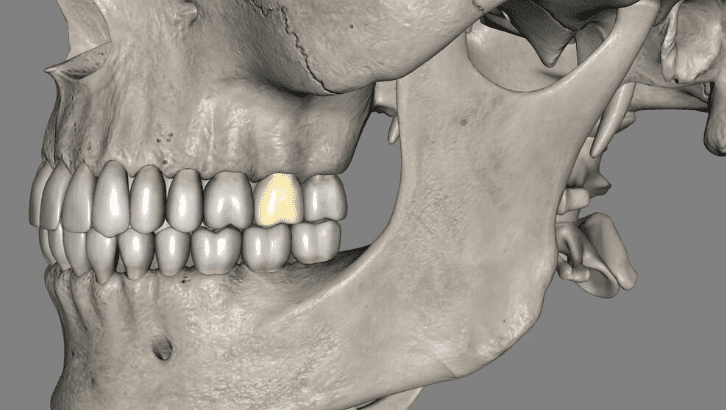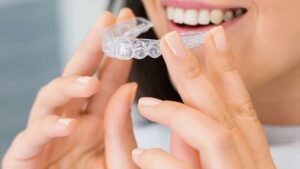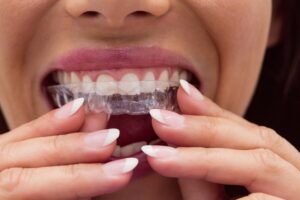Many people view dental implants as the best method for replacing teeth that are missing. They are hardy, stable, and seem substantially natural. The loss or loosening of a dental implant can cause a distressing situation, however. In this guide, we’ll explain what causes implants to come loose, what steps to take if it happens, how to resolve the issue, and prevent the problem moving forward.
What Are Dental Implants?
Dental implants are a modern replacement for missing teeth. They consist of a small titanium post that acts as an artificial tooth root. This post is surgically placed in the jawbone. A crown, bridge, or denture is then attached to this post, giving you a functional and natural-looking tooth replacement.
Benefits of Dental Implants
-
Long-lasting:
Well-cared for dental implants can persist for a number of years.
-
Natural look
- There’s a striking similarity in appearance and feel to real teeth.
-
Strong support:
- Implants offer more reliable stability than other selections for replacing teeth.
How Does a Dental Implant Work?
A dental implant requires bonding with the nearby jawbone for success. The process called osseointegration entails several months of time. Once this bond is complete, the implant provides a solid foundation for the dental crown or other attachments. However, if this bonding process is disrupted, the implant might become loose & fall out.
Parts of a Dental Implant
- Implant Fixture:The titanium post that connects with the jawbone.
- Abutment:The piece on top of the fixture that holds the crown.
- Crown:The visible part of the implant that looks like a natural tooth.
Why Did My Dental Implant Come Loose?
Investigating why an implant does not work can facilitate a resolution to the problem. Failures are usually classified as early & late, depending on when they happen.
Early Implant Failure
This type of failure takes place in the first several months after surgery. Causes include:
- Weak Bone Structure: In the absence of enough bone support, the implant won’t remain in position.
- Infection (Peri-Implantitis): Around the implant, a bacterial infection can provoke inflammation, lead to bone loss, & cause failure.
- Poor Surgical Technique: The wrong placement of the implant could stop it from integrating with the bone.
- Too Much Pressure Too Soon: Before it has a chance to heal, chewing & biting on the implant can lead to its failure.
Late Implant Failure
Late-stage failure happens months & even years after the implant has been placed. Common causes are:
- Overloading: Constant pressure from grinding your teeth can weaken the implant over time.
- Bone Loss: An implant can receive less support due to gradual bone loss.
- Gum Disease: Untreated gum disease can spread to the implant, leading to failure.
- Fractured Implant: Even though rare, the implant might fracture as a result of trauma or from excessive force.
Common Risk Factors for Implant Failure
- Smoking: Smoking causes a reduction in blood flow, delaying healing & stopping proper bonding.
- Diabetes: A poorly regulated diabetes can lead to a greater chance of infection and sedate healing.
- Poor Oral Hygiene: Failure to clean around the implant lets plaque accumulate, resulting in the chance of infection.
- Low Bone Quality: The implant needs healthy bone to stay secure.

What to Do If Your Implant Comes Loose
If your dental implant falls out, take these steps right away:
- Stay Calm: Although it’s frightening, a dentist can assist.
- Save the Implant: If you find the implant, gently clean it with saline & keep it safe in a small container.
- Don’t Touch or Chew the Area: Maintain leaving the area untouched to stop worsening the existing damage.
- Use a Cold Compress: Apply a cold compress to the outside of your cheek to reduce swelling.
- Contact Your Dentist Right Away: Schedule an emergency visit for a professional assessment & treatment.
Treatment Options for Loose Implants
In order to determine the best treatment course, your dentist will take into account the reason for the implant becoming loose, the condition of your jawbone, and the overall health of your mouth.
- Replacing the Implant: If your bone is still healthy, your dentist may replace the implant after treating any infections or other problems. This will involve cleaning the area & letting it heal before inserting a new implant.
- Bone Grafting: If bone loss is the issue, bone grafting may be needed. This procedure rebuilds the jawbone, creating a solid base for a future implant. It can take several months to heal.
- Gum Tissue Management: Soft tissue grafts may be needed to restore gum health around the implant in situations of gum recession.
How to Prevent Dental Implant Issues
Beginning with excellent daily care and routine dental visits are key to preventing problems with dental implants.
Oral Care Tips
- Brush Twice a Day: Use a soft toothbrush to clean your teeth and around the implant.
- Floss Daily: Remember to floss over the implant in the same way as the other natural teeth as to clean the food deposits or filming on the implant.
- Rinse with Antibacterial Mouthwash: This helps lower the chance of gum disease & keeps bacteria in check.
Lifestyle Changes
- Quit Smoking: Smoking increases the chances of implant failure.
- Manage Chronic Conditions: Controlling health issues like diabetes can speed up healing and lower risks.
- Avoid Hard Foods: Be careful with hard foods, which can damage the implant or cause it to come loose.
Visit Your Dentist Regularly
- Professional Cleanings: Regular cleanings help maintain the health of your implant.
- Check-ups for Your Implant: Frequent visits allow your dentist to check the implant’s stability and catch any issues early.
Frequently Asked Questions About Dental Implants
Q1: How Long Should a Dental Implant Last?
With proper care, dental implants can last 20 years or more. Factors like oral hygiene, lifestyle habits, and overall health play a significant role in longevity.
Q2: Is It Normal for an Implant to Feel Loose?
No, a dental implant should feel secure. If you notice any looseness, consult your dentist immediately.
Q3: How Soon Can I Replace a Fallen Implant?
The time frame varies based on the cause of failure and bone quality. In some cases, immediate replacement is possible; in others, healing time is required.
Q4: Will My Insurance Cover Implant Replacement?
Coverage depends on your insurance plan. It’s advisable to check with your provider about specific details.
When to Seek Professional Help
If you notice any signs of implant failure, such as pain, swelling, or bleeding, don’t delay seeking help. Early intervention can save the implant and prevent further complications.
Schedule Your Appointment Today
Losing a dental implant can be a frustrating experience, but it’s not the end of your journey to a beautiful smile. Our team of experienced professionals is here to guide you through every step of the recovery process. Schedule an appointment today, and let us help restore your confidence and smile!
References
- Howe MS, Keys W, Richards D. Long-term (10-year) dental implant survival: a systematic review and sensitivity meta-analysis. J Dent. 2019;84:9-21. doi:10.1016/j.jdent.2019.03.008
- Solderer A, Al-Jazrawi A, Sahrmann P, Jung R, Attin T, Schmidlin PR. Removal of failed dental implants revisited: questions and answers. Clin Exp Dent Res. 2019;5(6):712-724. doi:10.1002/cre2.234
- Jemt T. Single implants in the anterior maxilla after 15 years of follow-up: comparison with central implants in the edentulous maxilla. Int J Prosthodont. 2008;21(5):400-408. Accessible through PubMed.
- A systematic review by Howe et al. (2019) found that dental implants have a greater than 90% survival rate over a 10-year period, emphasizing their reliability (Howe et al., 2019).
- Research has shown that the probability of a dental implant component failing ranges from 2%–12% over a five-year period (Solderer et al., 2019). Additionally, the risk of the abutment or crown unseating and exfoliating over a 15-year period in function can be as high as 20%–59% (Jemt, 2008).







